創刊100年「文藝春秋」をどう変える?藤原ヒロシvs新谷学〝究極の雑談〟 vol.1
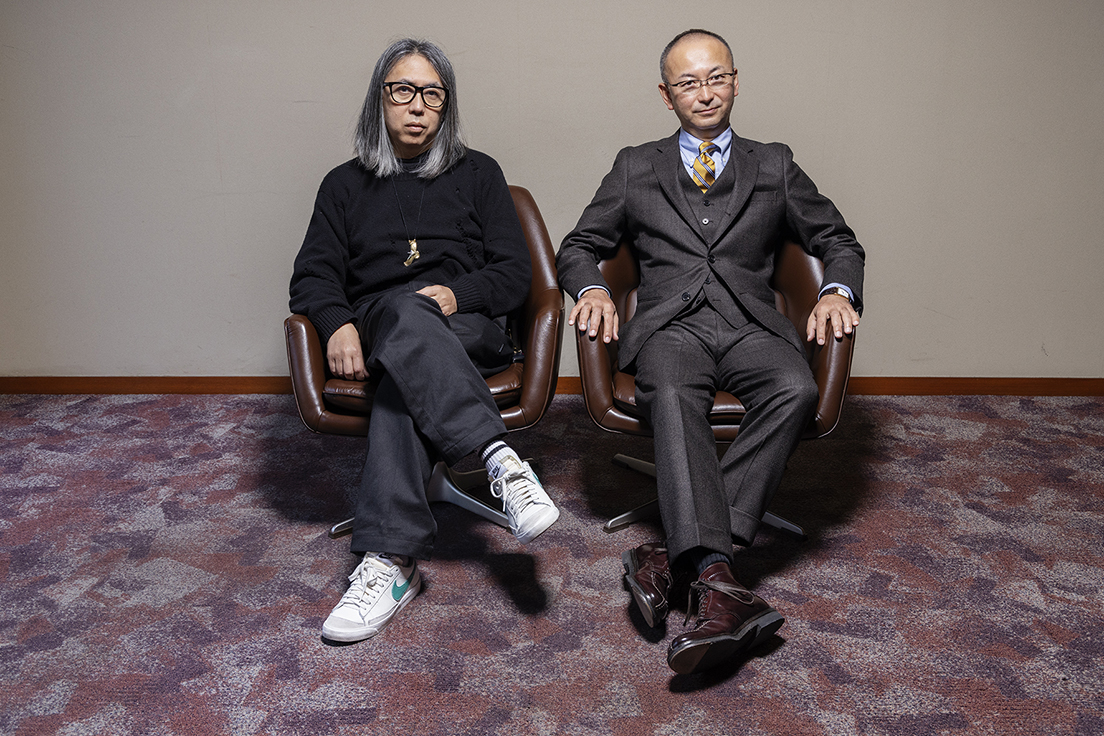
藤原ヒロシと新谷学による”忖度ナシ”の対談企画が帰ってきた。ブランド論から天皇制に至るまで、今2人が気になることを語り尽くす〝究極の雑談〟を、今回もウェブマガジン「JBpress autograph(オートグラフ)」とのコラボレートで全2回にわたってお届けする。 vol.1では、100周年を迎える雑誌「文藝春秋」の編集長に就任した新谷の挑戦や、藤原が参入したNFTという市場について。予測不能なトークを、写真家・立木義浩の写真とともにお楽しみください。
Photo_Yoshihiro Tachigi Edit&Text_Eisuke Yamashita、Mio Koumura
■1年ぶりの再会、それぞれの2021年
新谷 いやあ、今日は立木義浩さんに撮ってもらえるなんて、贅沢な取材だな。今日はこれで終わりでいいんじゃない(笑)? それにしても藤原さんとは、約1年ぶりにお会いしますね。去年は最終的にどんな年でしたか?
藤原 僕にとってはかつてないことなのですが、海外にも一度も行かず、ずっと日本で過ごしていました。なにか問題があるかなと思ったのですが、生活でも仕事でも、なにも変わらなかったですね。
新谷 でも、「BVLGARI(ブルガリ)」や「Loro Piana(ロロピアーナ)」をはじめとする海外ブランドとのコラボレートは、相変わらず積極的にやっていましたよね?
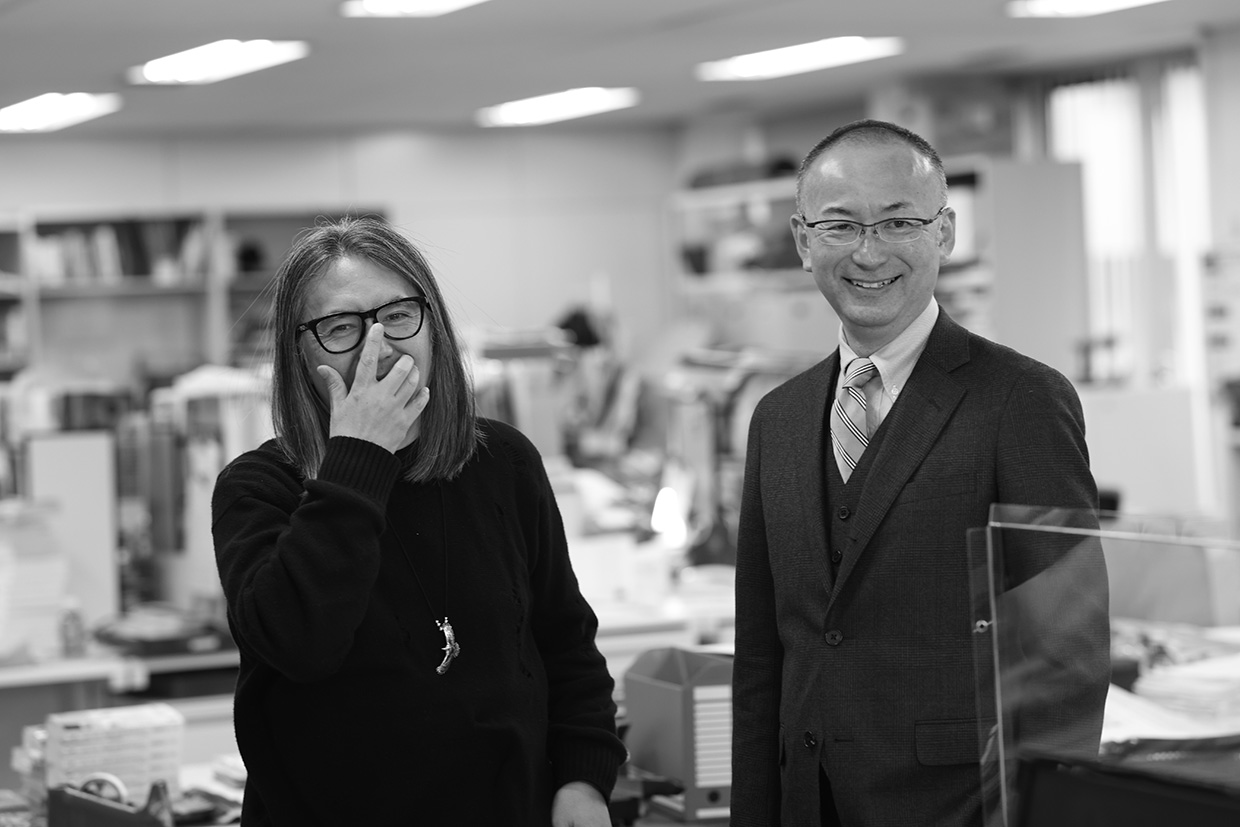
藤原 まあ、以前から進んでいた企画も多いので。でも、ブランドによっては一度も会社に行かず、社長にも会わず、スタッフともzoomのやり取りだけで完成させた仕事もあります。それでもできたわけだから、これから本当に仕事のやり方が変わるな、と思いましたね。新谷さんはいかがでしたか?
新谷 私は月刊「文藝春秋」の編集長になって、劇的に変わりました。「週刊文春」はある意味破壊的というか、批判的なメディアですよね。それに対して「文藝春秋」は、ダメなのはわかったけれど、これからどうすべきなの?という建設的な発信をするメディアなんです。まさに”スクラップからビルド”というか。だから今までとは全く違う筋肉を使って、気持ちいいな、という感覚がありますね。「週刊文春」的な動き方や働き方は自分のなかでもやりきったな、という思いもあったので、非常にいいタイミングだったような気がします。
■老舗を生まれ変わらせる、それぞれの”やりがい”
藤原 やり残したことというか、後悔なんかはあるんですか?
新谷 いや、まったくありません。むしろ「週刊文春」はもっとフレッシュな気持ちで、世の中に厳しい目を向けられる人がやったほうがいいですし。人間関係もスクラップ&ビルドで、「週刊文春」では”親しき仲にもスキャンダル”を実践していたので、どうしても人間関係が壊れちゃうんですよね。今は再構築していて、菅元総理とも、ひさしぶりに食事に行きました(笑)。藤原さんは、「文藝春秋」は読んだことはありますか?
藤原 いや、これから読むようにします(笑)。でもおそらく若い人は絶対買わない雑誌じゃないですか。だから今後どうやっていくのか、気になりますね。ただ活字って中毒性があって、一度読んで面白いのに当たると、それが癖になりますから、若者層とうまいマッチングができればいいんでしょうけど。
新谷 デジタルを使うというのが、一番わかりやすいアプローチですよね。もともと「文藝春秋」は、当時の流行作家だった菊池寛が創刊したんですが、編集者や読者におもねってものを言うのではなくて、自分が言いたいことを自由に言いたい、ということから生まれたんですね。自分のためにも、芥川龍之介を代表とするまわりの作家たちのためにも、自由に発信できる場所として。創刊号なんて本当にペラペラだし、同人誌ですよね。だからもう一度その原点に立ち返りつつ、究極に進化させて、デジタルと誌面をリンクさせながら、自由にものが言える場所をつくりたいと思っています。
藤原 誰かキュレーターみたいな人がいて、今月号のこの記事は面白い、とかまとめてくれると読みやすそうですね。
新谷 藤原さんは最近、海外の老舗ブランドの商品をリノベーションというか、アップデートさせるような仕事が多かったと思いますが、そういった仕事は楽しいですか?
藤原 老舗ブランドとの仕事はやりがいというか、変えがいがありますよね。ただできる限り自分勝手にならず、その枠内でやれることをやるように心がけています。
新谷 アプローチが職人肌ですよね。先方の要望をきめ細かに汲んだうえで、ほどよいところに格好よく落とすという。それでいて今日着ているLoro Pianaのセーターなんて、穴だらけじゃないですか(笑)。突き詰めていくと、センスとしか言いようがない。
藤原 穴が空いているセーターは、GAPでやっても普通なんですが、Loro Pianaでやるから意味がある。そういういい塩梅を探るのが面白いんです。
新谷 私としても、創刊100周年を迎えた「文藝春秋」の舵取りには、大きなやりがいと重さを感じていますね。もともと国民雑誌と呼ばれてきた雑誌なので、日本という国と正面から向き合う企画に取り組みたい。たとえば2022年は、部落解放同盟の前身である水平社や、日本共産党も創設100周年なんです。加えて100周年ということではありませんが、創価学会(1930年創設)。いずれも長い歴史を持つ組織が勤続疲労というか、いろいろと問題を抱えているので、そういうところに光を当てた特集も積極的にやっていきたいですね。
■「文藝春秋」、100周年の重みと新しいチャレンンジ
―もしヒロシさんに「文藝春秋」からプロデュースやコラボレーションのオファーがあったら、どうしますか?
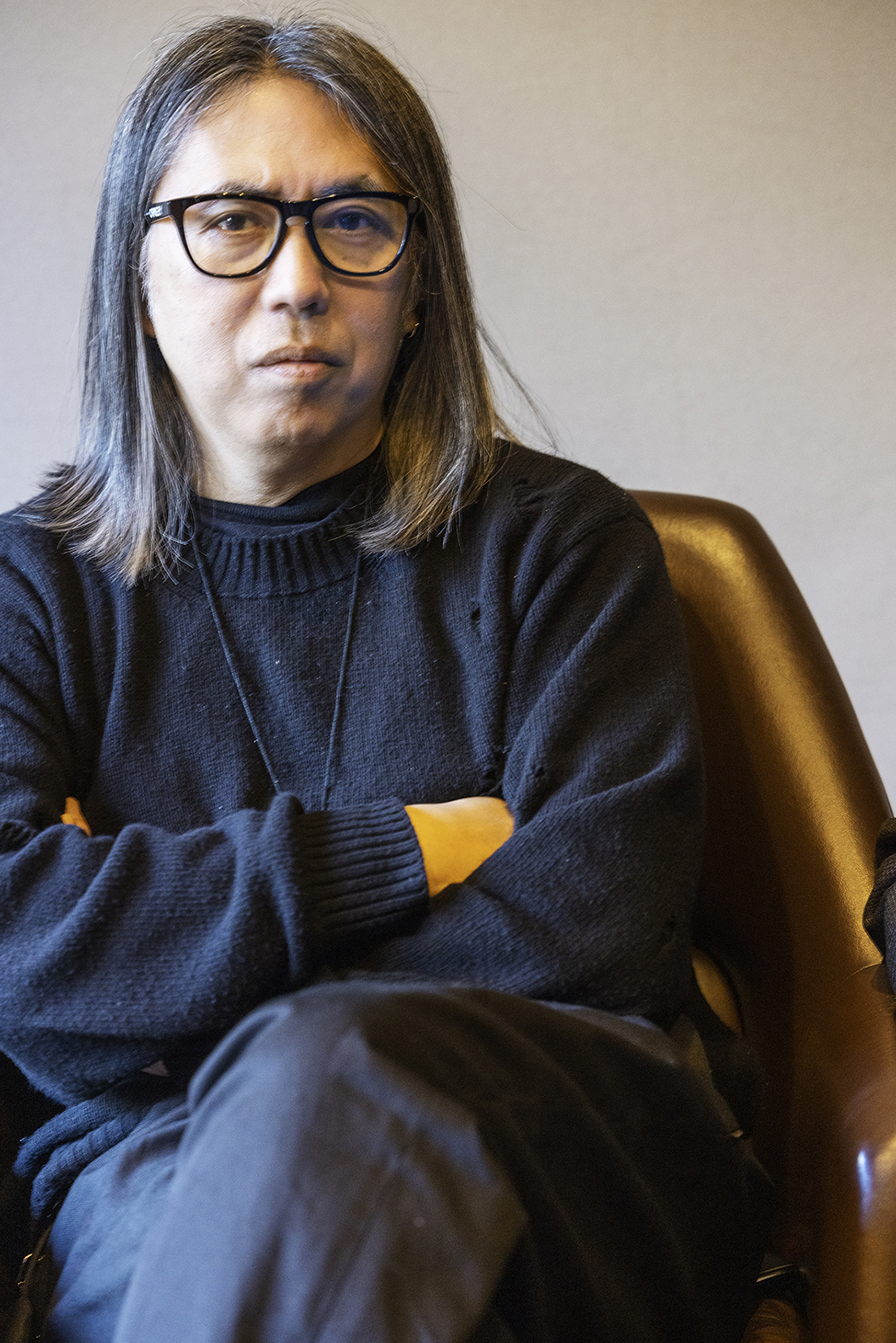
藤原 若い層を取り込めるのだったら、面白そうですね。たとえば表紙を写真や現代アートにしたり、という手はあるかな。
―ロゴはどうですか?
藤原 ロゴはいじりませんね。
新谷 私にもロゴをいじる選択肢はありません(笑)。表紙は今年から日本画家の村上雄二さんにお願いしています。村上隆さんの弟さんで、凄まじい技術でウルトラマンや仮面ライダーを描いちゃうような方(笑)。
藤原 そうなんですね。でもあまり変わったようにも見えないけれど。
新谷 それはやっぱり、この看板のもつ重さと言うか、力かもしれませんね。100年の歴史を持つメディアなので、ガラッと変えることは難しいし、そこまで変える必要もないですし。
藤原 話は変わりますが新谷さん、昨年やっていた『日本沈没』ってドラマは観られましたか? あれを観て僕は、官僚って本当に大変な仕事だなあ、と思ったんです。自分だったら日本が沈むとか、絶対アナウンスできなくないですか? もし沈まなかったら、それこそ大変なことになるし。だからああいうことを決めたり実行に移さなくてはいけない官僚たちを、ちょっと尊敬しました(笑)。
新谷 観ました。官僚ってあれだけ大変な仕事をしているわりに、給料はめちゃくちゃ安いんですよ。政治家には徹夜で酷使されて、天下りしたら叩かれて。そんな現状ですから、もう優秀な人材が集まりにくくなっていて、このままでは当然国家としてのクオリティは下がっていきます。
藤原 そうでしょうね。官僚ヒーローみたいな人がいっぱい現れたらいいんですけど。
新谷 昨年の11月号で、財務省のトップである矢野康治事務次官が実名で論文を書いてくれたんです。「このままのバラマキを続けていると、この国の財政は破綻しますよ」というセンセーショナルな内容で、とても売れました。この”矢野論文”は、『日本沈没』の官僚たちがしたように、彼にとって非常にリスクのあることなんです。でも彼は国の金庫を預かっている者として、リスクを冒してでもこれはまずいんですよ、と言っているわけで、その意見は当然傾聴に値する。これによって高市早苗さんや安倍晋三さんあたりは怒りましたが、私は批判の声があがったことも含めて意味があったな、と思います。そういう賛否が巻き起こることによって、分裂した論壇が、ぶつかり合うきっかけになったわけですから。
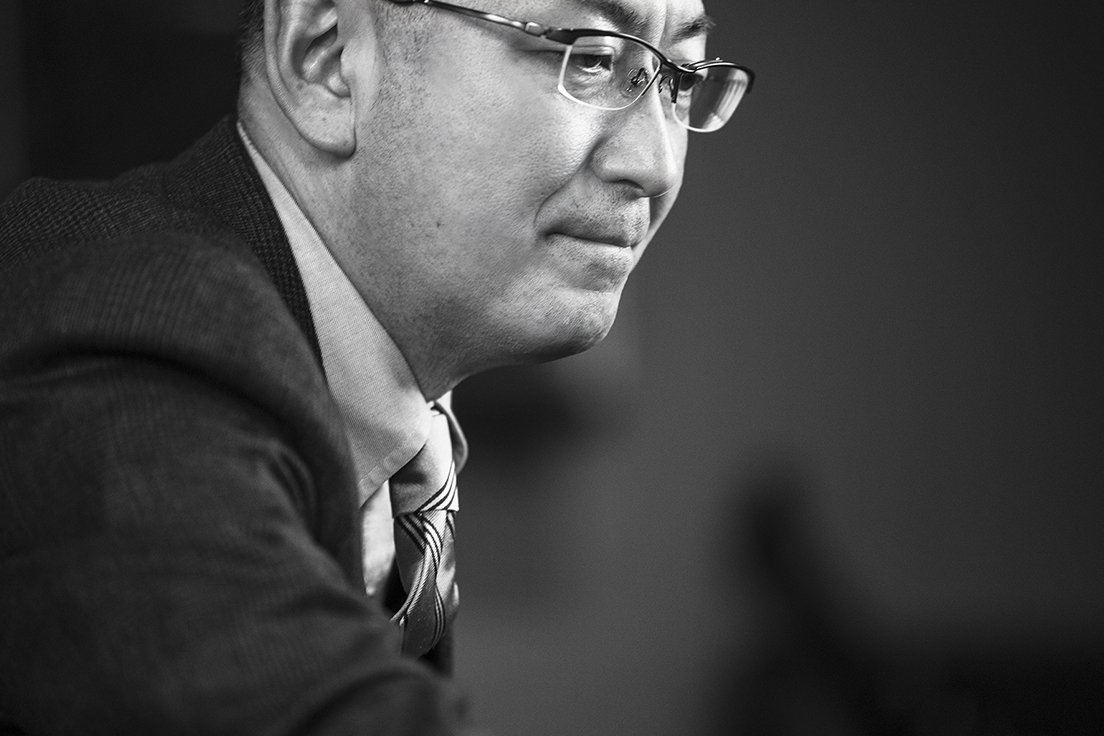
―財政に注目を集めるきっかけになりましたよね。
新谷 だから最近、永田町界隈では「文藝春秋」の注目度がぐっと増していて、高市早苗さんの総裁選出馬宣言や、台湾の蔡英文総統インタビュー、豊田章男さんの単独インタビューなどのコンテンツを通して、”とっておきの発信をする場所”みたいなイメージが徐々に広まりつつある手応えはあります。
藤原 僕らならそれで興味を持って読もうと思いますが、その下の世代にはなかなか伝わらない。そこは問題ですよね。
新谷 そうですね。ですから私にとっては、今日みたいな取材を受けるのも、「文藝春秋」の面白さを伝えるための、地道な活動の一環なんですよね。
藤原 Ring of Colourの読者は絶対に読んでないでしょうからね。「古本かな?」って思うかもしれない(笑)。僕としては、わかっているようでわからないようなもの、たとえば”暗号資産のその先”みたいな記事は読んでみたいですね。
■藤原ヒロシがNFTマーケットに参入して感じたこと
新谷 それはテーマとしてありますよね。それこそ藤原さんも「FRGMTRZM NFT」として、NFTマーケットプレイスに参入されていますし。
藤原 僕が始めたときは、まだNFTという呼び方もなかった頃です。メディアアーティストの真鍋大度くんが、以前からブロックチェーンを使ったアート作品を売っていこうとしていて、そこに誘われる形で始めたので。だからみんなが言うNFTとは、ちょっと最初のアプローチがずれているかもしれませんが、探り探り進めて、ようやくできたのがこの前の作品です。でもまだ全然わからないですね。
新谷 やっている本人でも(笑)。最近は、中学生が描いた絵がすごい値段になったりしていますよね。
藤原 でも、最近わかったのが、ある意味適当なものがいいんだなって。結局コレクタブルなものだと、そこから先に流通していかないんです。自分で持っておきたいから。適当に買ったけど飽きたから売っちゃって、また次の買おう、というくらいのものじゃないと、流通しないんですよね。
新谷 私が「週刊文春」をやってるときに一番腹を立てていたのが、私たちが発信するスクープがどんどん拡散していったときに、タダでその情報を使ってビジネスする人が出てくることなんです。ブロックチェーンの仕組みを使って、その情報にタグ付けすることで、拡散するごとにお金が入ってくるような仕組みにできればいいのですが、まだだいぶ先の話でしょうね。
藤原 逆にその技術によって、スクープ情報の無料化がますます進んでしまう可能性もあるから、難しいですよね。
新谷 確かに。藤原さんがNFTに進出したのは、クリエイターとしての純粋な興味ですか?
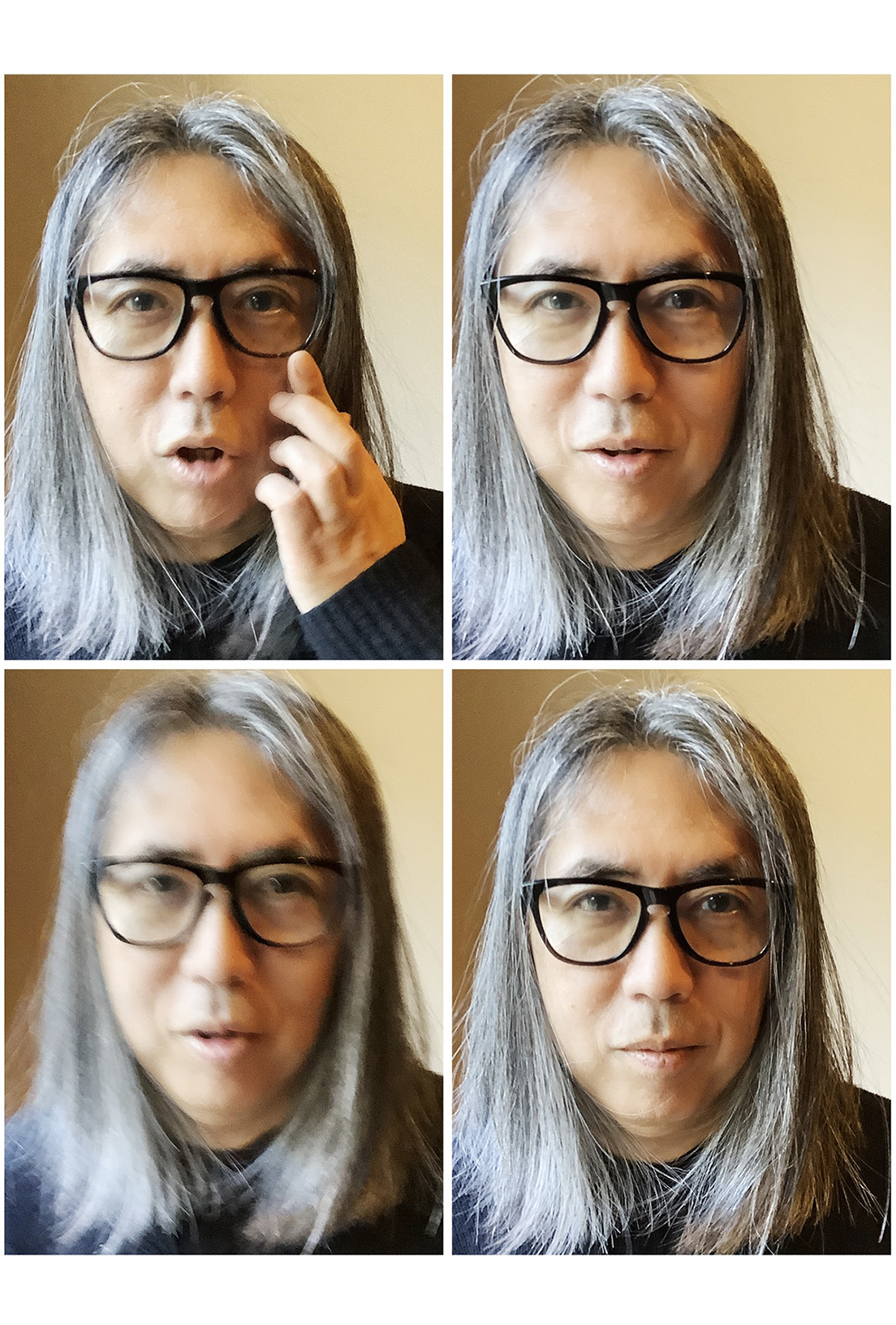
藤原 そうですね。僕自身はまだウォレットも持っていないし、何も買ったことはないです。まわりのみんなはNFTの次はメタバースと言っていて、興味は持っているんですが、両者はわりと違うな、と。NFTは制作側にまわることも容易なんですが、メタバースはその土地を買うだけなので、制作側にはなかなかまわれない。誰が早く土地を買うか、ということなんですが、結構リスキーですよね。Facebookも今メタバースに投資していますが、倫理的に彼らが土地を売るとは考えられませんし。NFTの価値も、まだしっかり上がり切るかの確証はありません。
新谷 すごいなあ。私はどうしても触れるとか、殴れるとか(笑)、実体のあるものを信じる人間なので、全然ついていけない。
藤原 今のところは富裕層の遊びでしかありませんから。でも今や中学生でも、お年玉をウォレットに入れてみようとか、0.001ビットコイン買おう、みたいなことはあると思うんですよね。
新谷 そういう時代にはなっていますよね。
藤原 1990年代の若手起業家の時代って、お金そのものがブームでしたよね。今はまた時代が一周して、金融トレンドになっているんじゃないですか。洋服よりもビットコイン買おう、とか。
新谷 その反面、LPレコードがバカ売れしている世界観もあるわけで、こういう時代だからこそ、物体のもつ価値が再認識されている部分もあるんでしょうね。でも、私なんかは、便利さもスピードもこれくらいでもう十分だけれど、世の中はどんどん先へ行くんだろうな。
藤原 新谷さん、毎月amazonの領収書とか見ます?
新谷 いや、見ないかなあ。
藤原 そうですよね。”amazonタダ派”ですよね?
新谷 いや、タダじゃないけど、確かに考えずに買っている(笑)。
藤原 ちょっと富裕層的な言い方だけれど、amazonはタダくらいの感覚という。SuicaもUberも、みんなそういう感覚になってきちゃうんですよね。
新谷 私は富裕層じゃないけれど、必要経費なので(笑)。藤原さんは現金を使うことってあるんですか?
藤原 ほとんど使わないですね。
新谷 では書店は?
藤原 たまに行きますが、本当に時間つぶしとして。書籍もできる限りKindleで読みます。
新谷 私は人間の型が古いのかもしれませんが、本はやっぱりめくって読む派だなあ。だからこそ、「文藝春秋」というプロダクトが持つ価値を訴えたいな、と思いますし。分厚くて重たいけれど、持っているとなにか格好いい、気持ちがいい、みたいな。
藤原 今の僕がそう感じるかはわからないけれど、昔はニューヨークとかロンドンで朝カフェに行くと、みんな新聞を読んでいて、それがとてもお洒落に見えましたよね。向こうは新聞が分厚くてスタイルの提案なんかもあって、そこで洋服も見れてしまう。あれは憧れますよね。
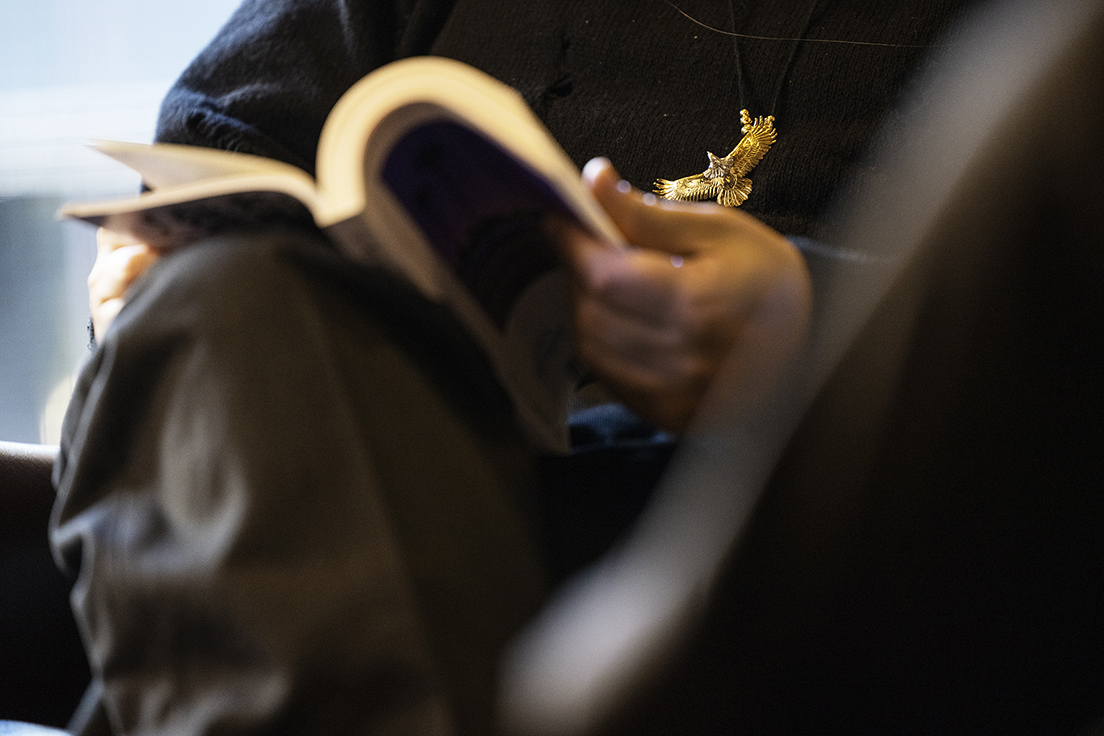
新谷 情報にプラスαがあるから、プロダクトとして手に取る価値が生まれるんですよね。そういう意味でいうと、「ニューヨーカー」誌は意識するところです。紙とデジタルが、双方向でうまく機能しているという意味でも。
藤原 ここに出ているものを、僕たちが友達同士で話すネタにするような感じになるといいですよね。今映画でやっている「GUCCI(グッチ)」やLVMHグループみたいな、ファッションコングロマリットの世界も面白いと思いますよ。専門誌でやっても面白くないし、そういうのが「文藝春秋」で読めたら楽しいんじゃないかな。穴あきニットがLoro Pianaにあることの意味にも通じますが、そういう分野ってまだあるんじゃないですかね。
新谷 それは嬉しいな。情報をください。いや、むしろ書いてください(笑)。ノンフィクションがお好きでしょうから、書評ページでも。
■今の時代、編集長は黒子であるべきか?
―近年、メディアも個人も、ブランドとしての舵取りを迫られていますが、その中でご自身が前面に立つということについては、どうお考えですか?
新谷 それは大切な判断ですよね。
藤原 僕は基本的にYouTubeとか、動画はNGにしていますね。特に自分のことを喋るのは。でも、どっちがいいんですかね?
新谷 ケースバイケースですが、私は”出るべきだ”という決断に至りました。「週刊文春」をやっているときに感じたのは、出ないことのデメリットです。要は”逃げている”とか”自分は顔を出さずに人のプライバシーに踏み込んでいる”みたいな批判ですね。以前は編集長といっても異動のあるサラリーマンだし、個が立ちすぎないほうがいいかな、と思っていたのですが、今はちょっと考えが変わっていて。「私がこういう考えでつくっている雑誌ですから逃げも隠れもしませんよ」と言ったほうが、読者に届く時代なのかな、と。
藤原 確かに、「文藝春秋」や「GQ」のような雑誌は、編集長の顔が出た方がいいけれど、タレントが集まった雑誌で同じことをやっても邪魔になるだろうし、何をメインに据えるか、ですよね。
新谷 その通りですね。編集者って行司みたいなものなんです。左右からお相撲さんを呼んできて、その相撲の行司は編集者や編集長がやる。あくまで主役はお相撲さんだけれど、マッチメイクや、その取り組みを面白く盛り上げる役割は、我々が果たさなくてはいけないんですよね。なので最近はいろんなお話をいただくことが多くてありがたいのですが、単なる行司が出たがりに見えた瞬間に冷めちゃうので(笑)、ある程度お断りはしています。藤原さんだって、もう山ほど断っているわけですよね?
■国旗の見える仕事はやらない、アナーキストの矜持
藤原 まあそうですね。
新谷 断る率は何パーセントくらいなんですか?
藤原 いや、それほどでもないですよ。どうせ頼んでも断られる、みたいに思われているのか。でも空気を読めない人が頼んできたりして、それが面白そうだから引き受けちゃおう、というケースもありますし。
新谷 この対談だってそうじゃないですか(笑)。たとえば国家にまつわるような依頼はどうですか?
藤原 それはしないですね。
新谷 断られているということですか?
藤原 そうですね。国旗が見え隠れするような依頼は断ります。
新谷 例えば今回のオリンピックとか?
藤原 ……ありましたね。具体的には言えませんが。
新谷 それはスクープですね(笑)。
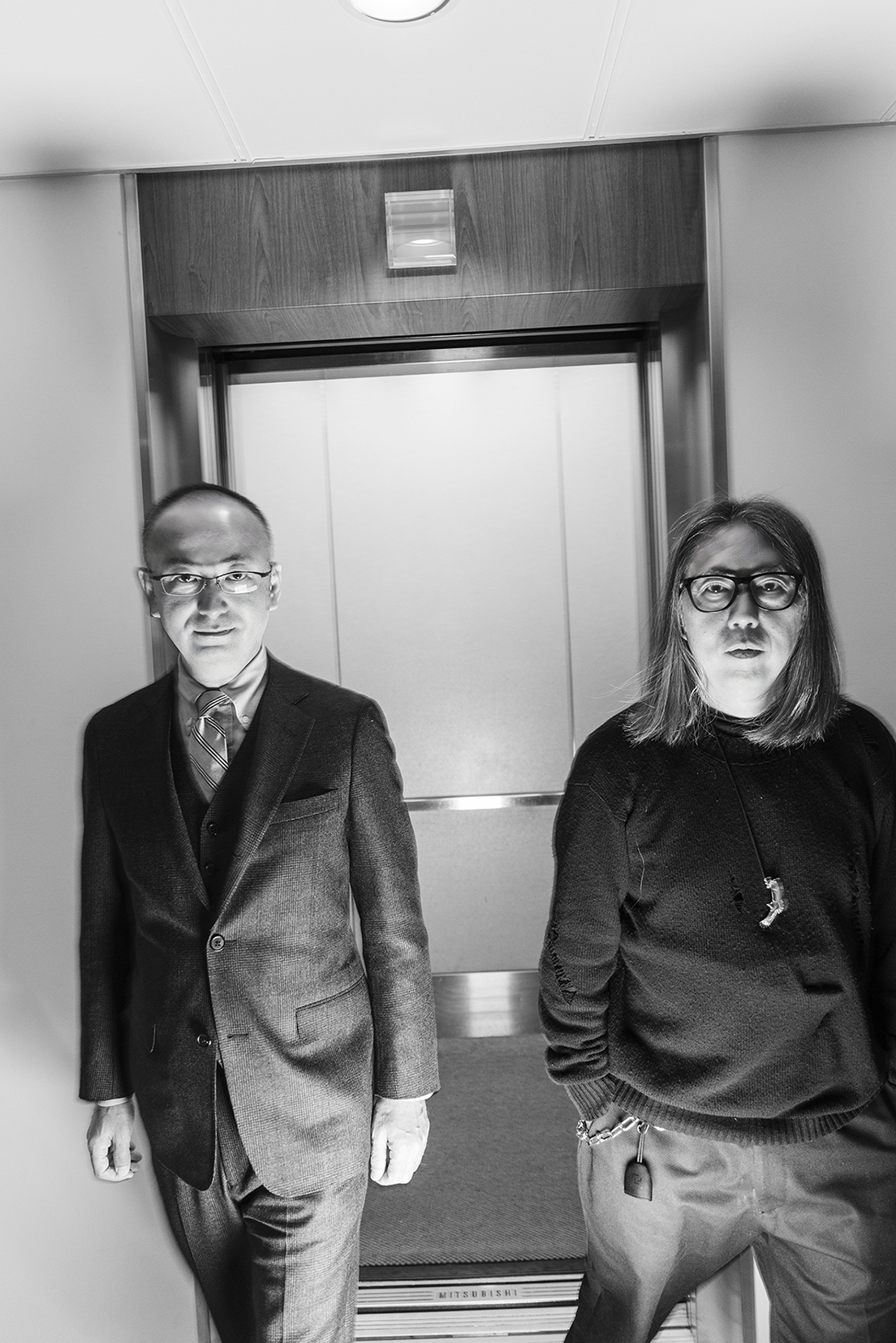
ーちなみにお二方は、昨年のオリンピックはどのように観ましたか?
藤原 僕は基本的に観ませんでした。
新谷 私は当事者に近い形で、開会式にまつわるスクープを打ちました。だからMIKIKOさんバージョンの”幻の開会式案”を観たかったなあ、と。あのスクープは組織委員会の橋本聖子会長から強い抗議を受けて、販売差し止め、回収を迫られたんですが、それに対して私たちは「オリンピックは莫大な税金を投入しているイベントで、その検証はメディアにとって大切な役割であるし、国民の知る権利に応えるものだ」という回答を出したんです。雑誌も売れましたし、文春の姿勢を示すこともできましたね。
■2021年の「ブランド論」対談
- Keywords:


